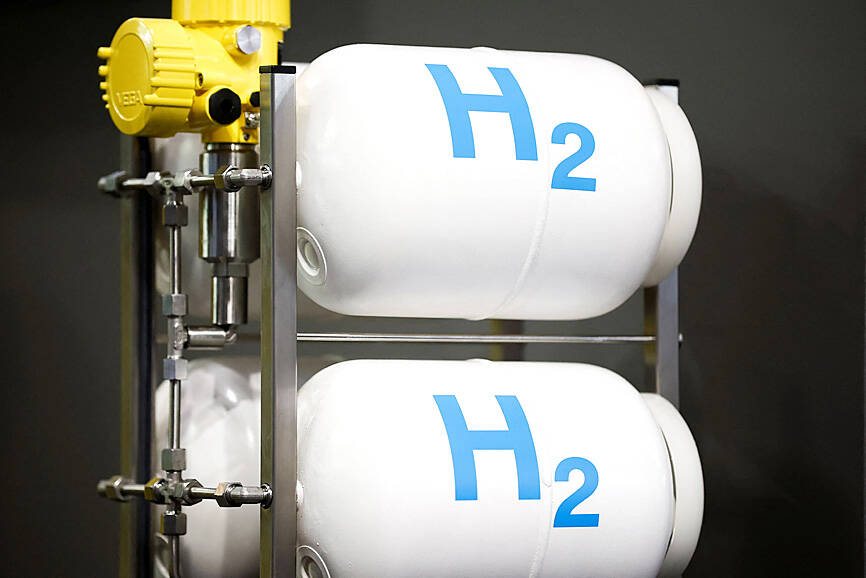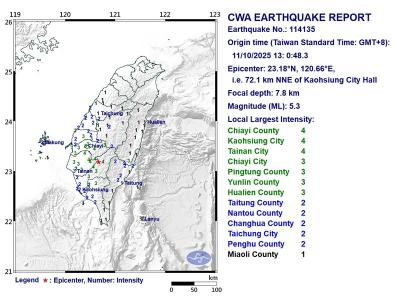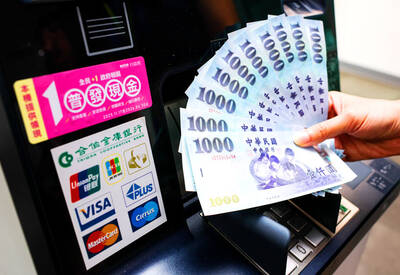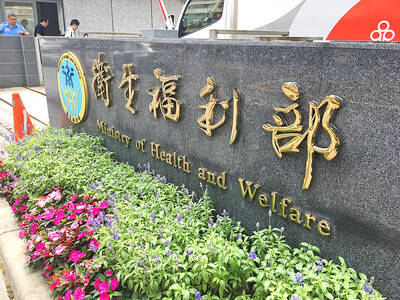The Ministry of Economic Affairs has completed a draft bill on guidelines for domestic low-carbon hydrogen source certification, which is expected to complement the Taiwan Renewable Energy Certificate (T-REC) system and would prevent repeated disclosures.
In 2023, 37 countries at the UN Climate Change Conference (COP28) pledged to develop their national low-carbon hydrogen certification mechanisms based on mutual recognition.
The Bureau of Standards, Metrology and Inspection in May completed the draft guidelines and has signed a memorandum of understanding with a technical support team from the EU’s Association of Issuing Bodies to jointly examine the draft guidelines and ensure their conformity with EU voluntary certification schemes, the ministry said.

Photo: Reuters
The preliminary structure of the guidelines mainly covers key technical aspects such as certificate issuance format, information disclosure items, cancelation procedures and carbon emissions inventory boundaries, the ministry said.
It is expected that the detailed regulations for domestic low-carbon hydrogen source certification would be established some time next year, it said.
Taiwan Institute of Economic Research assistant researcher Hsu Chia-wen (徐嘉?) wrote in an article that low-carbon hydrogen can help decarbonize energy-intensive industries and its certification mechanisms can provide such clean hydrogen with an identifier in line with international standards.
That would encourage companies to adopt low-carbon hydrogen and accelerate energy transition, he said.
An expert from the institute said on condition of anonymity that market demand for low-carbon hydrogen or green hydrogen — hydrogen produced by using electricity generated from renewable energy sources — is driven by economic incentives or compliance requirements.
Well-developed certification mechanisms would bolster international clean hydrogen markets, allowing the environmental value of low-carbon hydrogen to be verified, traded and incorporated into government policies, they said.
Once the guidelines developed by the ministry are implemented, hydrogen would no longer be just an industrial raw material for its manufacturers, as its market value would depend on whether it has verifiable environmental attributes, the expert said.
That means companies would have to provide full data on greenhouse gas emissions involved in its production for verification by a third party, including electricity sources, energy consumption during production processes, and raw material and transport emissions, they said.
Taiwan uses the T-REC system, so the low-carbon hydrogen certification system is designed to be complementary to T-REC, the expert said.
While T-REC focuses on electricity sources and renewable energy use, low-carbon hydrogen certification would evaluate carbon intensity and life-cycle emissions of hydrogen or hydrogen-based fuels, they said.
The two systems would be integrated to ensure that the environmental benefit of each entry of renewable electricity would be disclosed only once, the expert said.
For hydrogen-using companies, such source certification mechanisms would be indispensable tools to their international sustainability initiatives and supply chain disclosure, they said.
Sustainability frameworks such as the RE100 percent initiative, the Carbon Disclosure Project, the Science Based Targets initiative, the Task Force on Climate-related Financial Disclosures, the Corporate Sustainability Reporting Directive and the European Sustainability Reporting Standards require companies to disclose their energy sources and decarbonization contributions, the expert said.
Companies without credible certification of hydrogen energy sources might be less competitive in winning international orders and might face higher tariffs on their exports to the EU due to its carbon border adjustment mechanism, they said.
Taiwan would take a progressive approach to promote its low-carbon hydrogen certification mechanism, with a focus on domestic use of power and fuels, emissions during production processes and pre-delivery operations at the preliminary stage, the expert said.
Imported raw materials and overseas transport emissions would be incorporated later to reduce pressure on domestic industries, they said.

The Central Weather Administration (CWA) today issued a sea warning for Typhoon Fung-wong effective from 5:30pm, while local governments canceled school and work for tomorrow. A land warning is expected to be issued tomorrow morning before it is expected to make landfall on Wednesday, the agency said. Taoyuan, and well as Yilan, Hualien and Penghu counties canceled work and school for tomorrow, as well as mountainous district of Taipei and New Taipei City. For updated information on closures, please visit the Directorate-General of Personnel Administration Web site. As of 5pm today, Fung-wong was about 490km south-southwest of Oluanpi (鵝鑾鼻), Taiwan's southernmost point.

A magnitude 5.3 earthquake struck Kaohsiung at 1pm today, the Central Weather Administration said. The epicenter was in Jiasian District (甲仙), 72.1km north-northeast of Kaohsiung City Hall, at a depth of 7.8km, agency data showed. There were no immediate reports of damage. The earthquake's intensity, which gauges the actual effects of a temblor, was highest in Kaohsiung and Tainan, where it measured a 4 on Taiwan's seven-tier intensity scale. It also measured a 3 in parts of Chiayi City, as well as Pingtung, Yunlin and Hualien counties, data showed.

Nearly 5 million people have signed up to receive the government’s NT$10,000 (US$322) universal cash handout since registration opened on Wednesday last week, with deposits expected to begin tomorrow, the Ministry of Finance said yesterday. After a staggered sign-up last week — based on the final digit of the applicant’s national ID or Alien Resident Certificate number — online registration is open to all eligible Taiwanese nationals, foreign permanent residents and spouses of Taiwanese nationals. Banks are expected to start issuing deposits from 6pm today, the ministry said. Those who completed registration by yesterday are expected to receive their NT$10,000 tomorrow, National Treasury

Taiwan next year plans to launch its first nationwide census on elderly people living independently to identify the estimated 700,000 seniors to strengthen community-based healthcare and long-term care services, the Ministry of Health and Welfare (MOHW) said yesterday. Minister of Health and Welfare Shih Chung-liang (石崇良) said on the sidelines of a healthcare seminar that the nation’s rapidly aging population and declining birthrate have made the issue of elderly people living alone increasingly pressing. The survey, to be jointly conducted by the MOHW and the Ministry of the Interior, aims to establish baseline data and better allocate care resources, he